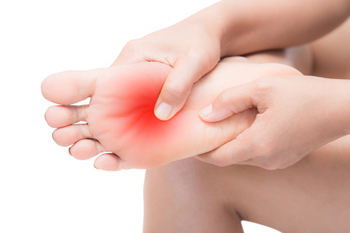 Peripheral artery disease, otherwise referred to as PAD, causes the blood vessels to narrow, which in turn, restricts blood flow to different parts of the body, including the feet. To help prevent developing this condition, it’s suggested that you commonly partake in physical activity and maintain low cholesterol levels. PAD can be difficult to diagnose, which is why it is so important to be aware of the symptoms. Hair loss on the feet and legs, leg weakness, ulcers on the feet or legs, numbness towards the lower extremity regions, and the foot or leg feeling cold, are all signs indicating you may have developed PAD. There are several methods to test for PAD. In order to properly diagnose this condition and receive the proper treatment, it is highly recommended to consult with a podiatrist.
Peripheral artery disease, otherwise referred to as PAD, causes the blood vessels to narrow, which in turn, restricts blood flow to different parts of the body, including the feet. To help prevent developing this condition, it’s suggested that you commonly partake in physical activity and maintain low cholesterol levels. PAD can be difficult to diagnose, which is why it is so important to be aware of the symptoms. Hair loss on the feet and legs, leg weakness, ulcers on the feet or legs, numbness towards the lower extremity regions, and the foot or leg feeling cold, are all signs indicating you may have developed PAD. There are several methods to test for PAD. In order to properly diagnose this condition and receive the proper treatment, it is highly recommended to consult with a podiatrist.
Peripheral artery disease can pose a serious risk to your health. It can increase the risk of stroke and heart attack. If you have symptoms of peripheral artery disease, consult with one of our podiatrists from Active Foot and Ankle Care, LLC. Our doctors will assess your condition and provide you with quality foot and ankle treatment.
Peripheral artery disease (PAD) is when arteries are constricted due to plaque (fatty deposits) build-up. This results in less blood flow to the legs and other extremities. The main cause of PAD is atherosclerosis, in which plaque builds up in the arteries.
Symptoms
Symptoms of PAD include:
- Claudication (leg pain from walking)
- Numbness in legs
- Decrease in growth of leg hair and toenails
- Paleness of the skin
- Erectile dysfunction
- Sores and wounds on legs and feet that won’t heel
- Coldness in one leg
It is important to note that a majority of individuals never show any symptoms of PAD.
Diagnosis
While PAD occurs in the legs and arteries, Podiatrists can diagnose PAD. Podiatrists utilize a test called an ankle-brachial index (ABI). An ABI test compares blood pressure in your arm to you ankle to see if any abnormality occurs. Ultrasound and imaging devices may also be used.
Treatment
Fortunately, lifestyle changes such as maintaining a healthy diet, exercising, managing cholesterol and blood sugar levels, and quitting smoking, can all treat PAD. Medications that prevent clots from occurring can be prescribed. Finally, in some cases, surgery may be recommended.
If you have any questions, please feel free to contact our offices located in Fair Lawn and Riverdale, New Jersey. We offer the newest diagnostic and treatment technologies for all your foot care needs.
Read more about Peripheral Artery Disease





